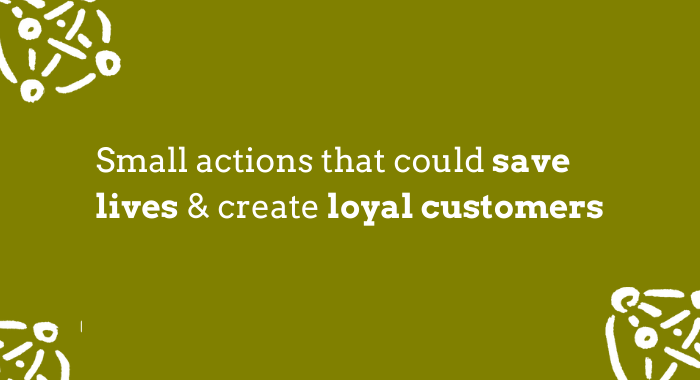Small actions to save lives and build loyalty

I really dislike the expression 'food to die for'. For most people it means eating something delicious. For me, it's a reminder that my daughter could eat something that will kill her. No food is worth dying for.
I used to think people with food allergies were just being faddy and attention-seeking. Since then I've woken up to the reality. You really understand how severe food allergies can be when you’ve travelled in an ambulance, sirens screaming, blue lights flashing while someone close to you lies motionless, monitors showing their blood pressure dropping dangerously low, doctor refusing to look you in the eye, crash team ready at the hospital. My heart is pounding as I recount this flashback to a time when food wasn't properly labelled, or to other times when someone didn't pass on the right information. I still feel the sense of desperation, praying we’d arrive at the hospital in time to save a loved one. We were lucky. Not everyone is.
On 1st October 2021 “Natasha’s law” came into force. It's named after 15-year-old Natasha Ednan-Laperouse who died from eating a Pret-a-Manger sandwich that she didn't know contained sesame seeds. The new law means that pre-packaged food intended for direct sale should now be fully labelled. This is in addition to existing food labelling laws.
It is a nuisance to have to list ingredients, but it could save lives. People with many allergies feel awkward about having to list them all out, nervous of being thought difficult or time-wasters. Adolescents and young adults are particularly vulnerable, sometimes in denial about their allergies, or nervous of ridicule by their friends. Being able to see the full list of ingredients, not just the 14 major food allergens, is really important. Many people have multiple severe allergies: some might be less common and not on the list of 14.
When a food allergy occurs it can be terrifying for everyone present. An epipen provides immediate treatment for anaphylaxis (typically trouble breathing) with an adrenalin injection. This can be life-saving but it's not fail-safe and even when it works, the effect isn't always immediate.
No one knows why more people are suffering from more allergies. The fact remains that there's incredible growth in the number of people suffering. Going out for a meal, getting a takeaway, buying pre-packed food or even a stay at a B&B can feel like Russian Roulette. We never know when a seemingly random allergic reaction will happen. What I can say is that when we find somewhere that's good at giving information on food ingredients and preparation, we're incredibly grateful. We write glowing reviews. We tell others. We return again and again. We're happy to pay more to feel safe.
The best places are those that label things clearly, train their staff and are ready to answer questions quickly and honestly. A general 'may contain nuts' type warning doesn't work well - it's too general for people with multiple allergies and can be over-used. Far better to be able to explain how food is prepared or to list the ingredients so we can assess the danger level. Even a 'don't know' is valuable information. The worst places are those where people guess and say 'I think it's safe'. It rarely is.
I normally write marketing blogs so this one may seem a bit different. But actually there's a marketing angle here. If you can genuinely understand and cater for people with food allergies, there's a growing market. People will return again and again to places they trust.
You can find out more about Natasha's Law and other guidance for businesses that serve food here.


1 comment
Back in my pub/restaurant managing days whilst overseeing a wake I overheard the widow of the dear old gentleman that had passed away exclaim "This chocolate cake is to die for." 🙊
During my days teaching Hospitality & Catering it was frightening how many establishments out there seem completely oblivious to the consequences of what would happen to them if someone was to die because of this. The lack of staff training and awareness also very, very scary.
Leave a comment